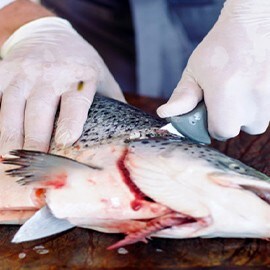
Food cross-contamination is known as the transfer of bacteria or other microorganisms from one substance to another. Cross contamination can also occur in allergens, chemicals and toxins. Cross Contamination in food can occur in the following 3 ways:
- Food to Food
- People to Food
- Equipment to Food
The below tips will help you prevent cross contamination and prevent food-born illnesses among your guests:

1. Check the delivery temperature
When fresh produce is delivered, measure the temperature of each ingredient. If the temperature is not correctly chilled, bacteria can grow faster, leading to the birth of food-borne illnesses. If this is the case, call your delivery partner immediately and return the produce.
See the common Delivery Checkpoints you need to check?

2. Keep Toxic Chemicals away from Food
Keep toxic chemicals and cleaning products away from food. Never put hazardous substances above food.

3. Floor Level storage is a no-go
Do not store boxes on the floor, but on a raised platform or shelf. The floor is a source of bacteria. According to the 2009 FDA Food Code, all foods in a commercial kitchen must be stored at least 6 inches above the floor.

4. A well looked after Storage Space goes a long way
Make sure the storage space and products are clean and hygienic. You should be able to close the storage area to keep it dry and safe from pests.

5. Use the FIFO system
FIFO stands for First-In First-Out. It is a system for facilitating stock storage. Products with the earliest best before date should be placed at the front of the storage area, whereas products with the furthest dates can be kept at the back. In using a FIFO food storage system, you ensure that food with the soonest BB dates are used first. This system maximizes freshness and minimizes waste.

7. Stick it with a Label
When food is prepared, remember to add preparation date to dish. It's best if you use stickers here with components such as date, dish name, date of prep.
Food Cross-Contamination: Do's & Don'ts:
-
DO'S
DON’TS:
- Keep raw ingredients away from cooked food
- Chop raw and cooked meat on the same chopping board
- Keep cooked meat above raw meat in the refrigerator
- Handle raw food then cooked food without washing your hands
- Keep food covered and protected
- Touch the garbage bins with your hands
- Clean and sanitize all equipment and benches
- Use the same knife for raw and cooked ingredients without washing it before
- Wear clean clothing
- Wash hands before handling food
.jpg)
Free Hand-washing Poster
Download this "handy" poster to be used among kitchen staff when washing hands.
Grow Your Business with Food Delivery
Get tips about food delivery, and more!
Need real solutions and tips on how to grow your business with food delivery during the COVID-19 period? Get them here.
Nutrition is a Must During COVID-19
Make your dishes tasty and healthy
Nutritious menu inspirations will support your culinary business. Here's how to implement more of them!
Protect Your Profits Against COVID-19!
Keep your business from going into a slump
Get some great tips on how to guard your profits during the pandemic.
Best Products for You
Get product recommendations from Unilever Food Solutions
Support your culinary business with the best UFS products suited to your dishes.



